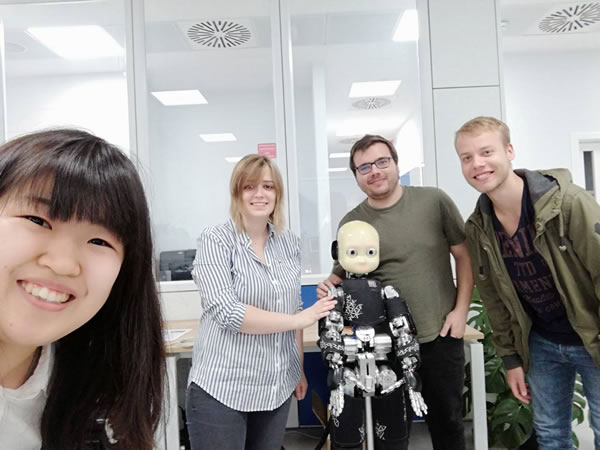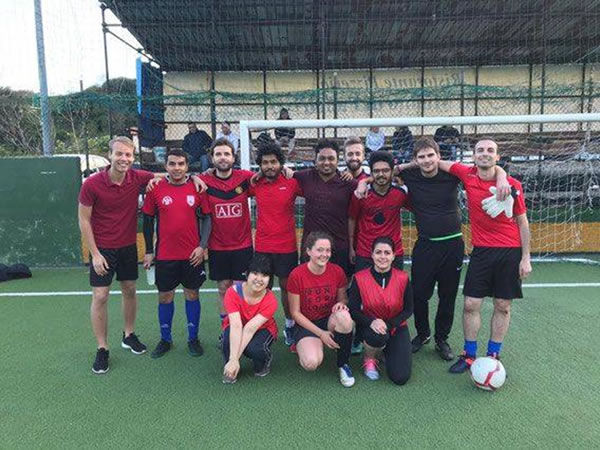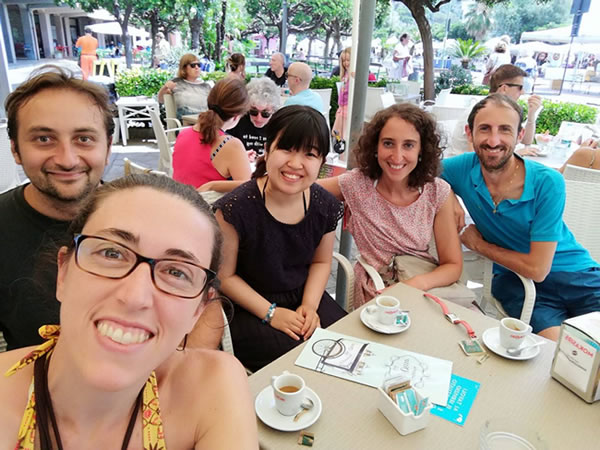Content of the study program
I worked on humanoid robot manipulation research using iCub, a humanoid robot. Postdoc researchers helped me with my research at the lab. The lab specialized in pattern recognition and object detection of robots. I wanted to manipulate the deep neural network model using both tactile and visual perceptions. After consulting about the research theme, I decided to work on the topic of “cutting a pizza using iCub”. As iCub makes a movement, data from the camera mounted on the head and information from the force sensor are collected to generate the proper course of action for the next moment as iCub grasps the current situation. This process is repeated. The goal for iCub was to successfully cut a pizza without damaging the desk using tactile senses by visually understanding the position of the pizza.

Study results
Because both the type of robot and developing environment were new to me, it took me a long time to set up the experimental environment and learn to control iCub. At first, I moved a robot on the target track and collected the data. The control method that I previously used for another robot in Japan caused vibrations and shifted the robot away from the target track. Thus, I had to code in a way to constantly and flexibly change the movement speed based on iCub’s functionality. Then, using the obtained data, the neural network model was trained. It learned how the target changed based on the joint movement (how to move to cut a pizza). Lastly, as an evaluation, a random shaped pizza was placed at a random place to see if the robot could cut it successfully. I did not have enough time to experiment with the real robot. However, the simulation was successful!
As for English, I acquired skills to substitute expressions when I couldn’t come up with correct words while speaking. At first, it was very difficult to instantaneously come up with words. There were many situations that I could not move on without understanding. So, I desperately listed words to get answers to my questions. From there, I gradually became better. I will further study to break down the language barrier.

My experience abroad
While living in Italy, many things were completely different such as how to talk, proximity of personal space, sense of time, and attitude towards food. This made me realize the profound difference in culture. In particular, I was baffled by the way they talk. Many times, I was asked my opinions and deeper questions. Then they gave me counter arguments. Thus, it is important to have your own opinions. I also noticed that many people were talkative and would often start talking while others were still speaking. I was frustrated by the fact that I was not able to converse with such speed.
The carefree culture in a good sense was comfortable as I was able to relax and unwind moderately. At stores, salespeople chat while working, and some of those who became friends gave me a discount. As for the bus schedule and meeting time, the unpunctuality was often frustrating. Nevertheless, I thought we should learn about work-life balance from them.
My overseas experience provided me a good opportunity to rethink about Japanese culture. In Japan, we are expected to perform punctually and perfectly following a manual to an overly great extent. Perhaps, it is okay to relax a bit more.

Influence on my future career
There were many doctoral candidates and postdoc researchers at IIT. They were from around the world. Besides Italians, there were people from India, Germany, Spain, and China. I was able to widen my perspective after listening to their research and their course of studies. Some people switched their research field dramatically, while other were working across three or more universities and research institutes. Some even worked in multidisciplinary fields. I realized that it is not necessary to focus on one thing or worry about age. When there is something you want to do, you should find your own method and pace to realize your goal. However, it is important to have the ability to realize your goal by getting the necessary help from others. From now on, I will include not only Japan but also the world in my long-term vision to pursue a career in robotic research. For that, I feel it is important to widen my perspective and improve my abilities as a researcher.
Other comments
I have a fond memory of inviting friends from the lab and the owner of my apartment to my room for Japanese food such as Nikujaga (meat and potatoes), Oyakodon, and miso soup. Everyone was so curious, and they never stopped asking me questions about the ingredients and how to cook. I was also involved in the soccer team of the lab and participated in the lab soccer tournament at IIT. As I am basically new to soccer, I could not contribute much on the pitch, but I cheered from the sidelines, and became friends with people on the team. On holidays and after my research was done for the day, I went to sightseeing, to the beach, to a bar, and played billiard with my friends. Besides conducting research, being able to communicate with the locals was the best experience. As I treasure my new relationships, I plan to keep in touch with them.
I would like to express my deepest gratitude to the professors and people from SGU who have given me such a wonderful opportunity. I also gained confidence in my ability to understand different cultures, widen my perspective, and live abroad. This experience has improved my future.


